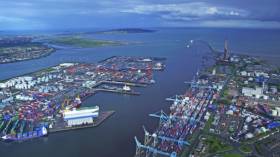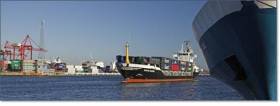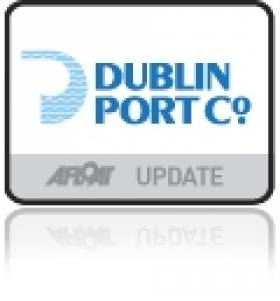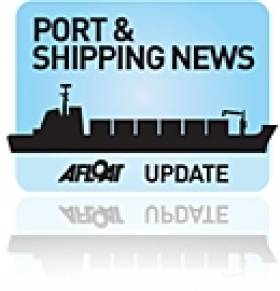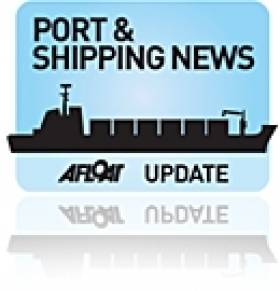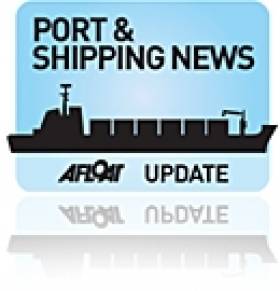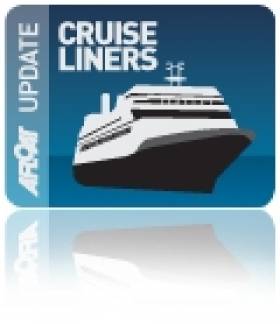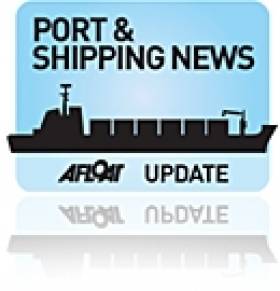Displaying items by tag: ESPO
Dublin Port Hosting 2016 ESPO Conference In June
#ESPO2016 - The European Sea Ports Organisation (ESPO) is inviting its members, policy makers and stakeholders to join in the 13th edition of its annual conference, which will be hosted by the Dublin Port Company at The Printworks in Dublin Castle on 2-3 June 2016.
The 2016 ESPO Conference, moderated by broadcaster Claire Byrne, will look into ways to improve the efficiency of maritime transport and ports from different angles.
The first session will focus on the different barriers to the internal market for maritime transport. As maritime policy is at the top of the 2017 European Commission agenda, the ESPO conference aims at preparing the ground for this important year for the maritime and port sector and at feeding further discussions.
Is there a digital agenda for ports? Is there a role for policy? How can ports utilise 'big data' to their benefit? Are we ready to open up the flow of data? How to protect ports against risks of cybercrime? All these questions will be tackled in the second session.
The third session will address the issue of 'game changers' and possible 'game stoppers' when it comes to easing trade. The conference will investigate how TTIP, the trade agreement under negotiation with the US, could possibly benefit ports, on both sides of the Atlantic.
The conference will further zoom into the Chinese 'One Belt, One Road' policy and assess how it might affect European port-hinterland dynamics, as well as the possible impact of a 'Brexit' for UK and neighbouring ports, and how temporary border controls are impacting the European transport and logistics chain.
As usual the conference will close with a policy debate where high-level EU policy makers will present their views on the issues discussed during the conference and enter into a final debate with port authorities.
DG MOVE’s director general Henrik Hololei; Mark Frequin, representing the Dutch Presidency of the Council of Europe; and Pat Cox, former president of the European Parliament and TEN-T coordinator for the Scan-Med Corridor are getting prepared for this session. MEP Knut Fleckenstein will address the conference at the end of day one.
On 3 June, American top economist and influential thinker Jeremy Rifkin will give a keynote address on the theme of 'a Third Industrial Revolution and a Zero Marginal Cost Society'.
The first day's conference sessions will be followed by the Admiral’s Ball, a gala black tie evening celebrating the Lord Mayor of Dublin’s honorary Admiralty of Dublin Port.
The event also launches the Dublin Port Riverfest with a sophisticated evening of fine dining and premium entertainment promised for a guest list of Dublin’s premier business hub and international conference delegates.
Full details of the conference schedule can be found at the ESPO website HERE.
European Sea Ports Organisation to “Think Climate”
#ThinkClimate- Tackling global climate change is a concern of all European ports. In this spirit and in the light of the Paris Climate Conference last December, the European Sea Ports Organisation (ESPO) has joined the “Think Climate” coalition that has been set up under the umbrella of PIANC, the World Association for Waterborne Transport Infrastructure.
Think Climate brings together major international associations with interests in waterborne transport infrastructure, with the objective to help the sector respond to climate change.
By further understanding, providing targeted technical support and building capacity, the coalition has a double aim: first of all, to promote the reduction of greenhouse gas emissions, by shifting to low carbon maritime and inland waterway transport infrastructure.
Secondly, address ways to adapt maritime and waterborne infrastructure and operations to the potential impacts of climate change such as sea level rise and extreme weather conditions. The latest newsletter of the initiative highlights the ongoing actions and the way forward.
#PlaceOfRefuge - European Sea Ports Organisation (ESPO) together with all maritime industry stakeholders, the European Commission and EMSA co-signed a joint declaration to express their support for the recently adopted EU Operational Guidelines on Places of Refuge.
The declaration took place during an event in the European Parliament on Wednesday organized by Gesine Meissner, MEP and President of the Seas, Rivers, Islands and Coastal Areas (SEARICA) Intergroup of the European Parliament. Commissioner for Transport, Violeta Bulc, also joined the conference as a way to support the initiative.
The guidelines are the result of the joined effort of Member States authorities, the Commission, EMSA and the maritime industry who have been working together for more than three years within the framework of the Co-operation group on places of refuge. They aim to enhance the communication and cooperation between the relevant authorities in the Member States in situations where a ship in distress requests a place of refuge, and also to streamline the decision-making process.
The guidelines have and will be further tested during dedicated exercises. As such, they are seen as a living document that can be further improved to incorporate lessons learned.
Isabelle Ryckbost, ESPO Secretary General said,“We fully support these guidelines. Time is the most important factor when dealing with a ship in distress. These guidelines will certainly help shortening the decision making process and avoid loss of time. The guidelines are a living document. We are looking forward to continuing the work on them, together with all stakeholders involved. We are happy that the cooperation group will also work on issues related to insurance, liability and compensation for ports accommodating a ship in distress. Bringing more clarity in these issues could certainly further facilitate the decision-making process”
High Environmental Recognition Award for Dublin Port
#EnvironmentAward - A Port Environment Review System (PERS) certificate was presented to Dublin Port yesterday during a dedicated ceremony at the ESPO annual conference in Athens.
Mr Santiago Garcia Mila, ESPO Chairman, handed over the PERS certificate to Eamonn O'Reilly, Chief Executive, Dublin Port Company.
"We congratulate Dublin Port for achieving the PERS certification, in particular since it has been a long-time supporter of the EcoPort tools and approach. Dublin Port is a good example to follow as it achieves a PERS certification for the fourth time in a row", said ESPO's Chairman Santiago Garcia Mila.
"We are very pleased to receive this PERS certificate for the fourth time in a row. Receiving this PERS Certification at the ESPO Conference is a great honour for us especially as we will be hosting the ESPO Conference in Dublin next year" said Eamonn O'Reilly, Chief Executive, Dublin Port Company.
PERS is the only port sector specific environmental management standard. It is the flagship product of the EcoPorts network and is offered as part of the ESPO services to its members through the EcoPorts website.
Compliance with the PERS standard is independently assessed by Lloyd's Register Quality Assurance and the certificate has a validity of two years.
ESPO is delighted to observe the increased interest shown to PERS by European port authorities and encourages all ports within its membership to implement the scheme and to get certified.
ESPO Hopes Junker Investment Plan Does Not Undermine New TEN-T Policy
#ESPOjunker - The European Sea Ports Organisation (ESPO) in late January held an internal seminar on infrastructure financing.
The seminar aimed to give ports some practical information on what to expect from European Investment Bank (EIB) lending and financial instruments.
Speakers came from the European Commission, European Investment Bank and the EU's Innovation and Networks Executive Agency (INEA). Presentations focused on the new European Fund for Strategic Investment (EFSI) that is being set up following a recent initiative by European Commission President Jean-Claude Juncker, as well as existing instruments such as classic EIB lending, the Loan Guarantee Instrument for Trans-European Transport Network Projects (LGTT) and project bonds.
Ports were particularly interested in the details of the Juncker Plan. The European Fund for Strategic Investment (EFSI) aims to leverage investments in the magnitude of €315bn by covering part of the risk of projects.
For this purpose, the EU plans to set up a guarantee fund. Of the €8bn that are to be taken out of the EU budget for the new guarantee fund, EUR 2.7bn are to come from the transport envelope of the Connecting Europe Facility (CEF), in particular from the general grant part of the CEF envelope.
This means that the overall sum available for grant funding of transport projects (in non-cohesion countries) is considerably cut by the Juncker plan. The existing envelopes for financial instruments and transport investments in cohesion countries remain untouched.
The TEN-T Guidelines defined a stringent methodology for the eligibility and priorities of transport infrastructure. During the past year, the Commission, member states and infrastructure managers have jointly worked on corridor work plans that are to identify the priority projects with the highest European added value that should thus be the first recipients of EU funding.
In this methodology, ports are seen as the entry and exit points to the European corridors and are thus the strategic starting point for defining the transport needs of Europe. However, under the EFSI, any European transport project independent of location and mode of transport can receive funding. This shifts the logic away from the carefully chosen transport priorities of the CEF and TEN-T
Moreover, the EFSI does not ring-fence money for any particular type of investments. Different sectors ranging from energy, to education and health will be competing for financing. The money transferred from the CEF could thus end up being absorbed by other sectors if these are better able to present mature projects with clear revenue streams.
ESPO Secretary General Isabelle Ryckbost said: "Ports have been given a strategic role in the new TEN-T policy. We are a little concerned about what we have learned today about the new European Fund for Strategic Investment. By shifting a part of the CEF grant money to the new financial instruments we are not only diminishing the possibility for ports of receiving a grant but there also seems to be a possible shift in priorities."
She added "The criteria used by the EIB to assess projects are very different from the priorities set by the new TEN-T policy, which recognises the important role of ports as core nodes of Europe's Transport Infrastructure and entry and exit points to the European corridors."
ESPO Meets New EU Commissioner for Transport
#EUTransport - European ports work, they make transport work, make the economy work, make their environment work. That was the main message given by the European Sea Ports Organisation (ESPO) during their meeting today with the new EU Commissioner for Transport, Violeta Bulc.
Mrs Bulc met with ESPO Chairman, Santiago Garcia-Milà, ESPO Vice Chairs Eamonn O'Reilly (also Chief Executive of Dublin Port) and Annaleena Mäkilä and ESPO's Secretary General, Isabelle Ryckbost.
European port authorities need a policy that empowers them to successfully match commercial and public interests, and to meet the various challenges that both market forces and society imposes upon them.
Notwithstanding their diversity, European port authorities believe that more autonomy, be it commercial, financial and/or organisational will serve them best in facing the challenges ahead.
ESPO and the Commissioner exchanged views about the challenges ports are currently facing, and the vital role ports play for Europe's economy and growth.
In that respect, ESPO stressed that European ports are real drivers of economic prosperity and are to be seen as much more than a place where ships are simply loaded and unloaded.
Furthermore,the ESPO representatives outlined what European policy can do for ports and presented in that respect ESPO's recent memorandum, which highlights six points of attention for the new Commission and Parliament.
Finally, ESPO informed the Commissioner about its position regarding the port regulation proposal. ESPO stressed the importance of a EU ports policy that:
• Ensures full autonomy in setting charges and minimum requirements for port services
• Guarantees financial transparency where ports receive public funding
• Gives clear guidance on state aid for port investments.
ESPO Chairman Santiago Garcia-Milà asked for the support of the Commissioner on these points. "The Council has set important steps towards a more realistic and workable regulation. However, by letting Member States decide whether to give ports more autonomy or not, the Council risks to further undermine the level playing field between European ports. We want the autonomy of ports strengthened in Europe, as it was initially proposed by the Commission and is supported by the rapporteur in the European Parliament. We have asked Mrs Bulc to support us in that plea".
At the outcome of the meeting, ESPO's Secretary General Isabelle Ryckbost said: "We very much welcome the opportunity given by Commissioner Bulc for an open dialogue with ESPO and some of our members and we are very much honoured to have met Mrs Bulc early in her mandate. The Commissioner seems to understand both the diversity and potential of European ports. I am confident we can look forward to a constructive cooperation with the new Commissioner".
After the exchange of views with ESPO, the Commission also met with representatives of a selection of European ports for a two hour discussion on issues affecting the sector
Transport Council Deals on Port Regulation
#PortRegulation – The Transport Council yesterday reached an agreement on the Port Regulation proposal.
The European Sea Ports Organisation (ESPO) recognises the enormous efforts made by the Italian Presidency to reach a deal on this very difficult proposal and believes the Council has made substantial progress on different important issues. These mainly relate to:
- The deletion of dredging from the list of port services. Dredging, be it capital or maintenance dredging, has to be considered as a part of the development and maintenance of the port infrastructure, not as a port service.
- The provisions related to the users committee and stakeholders consultation, by choosing for a more pragmatic, bottom-up approach.
- The handling of complaints. The original proposal for an independent supervisory body has been replaced by a more realistic provision setting out a procedure for the handling of complaints.
ESPO however believes that more needs to be done to create a ports policy that means a step forward for every single port in Europe. The European port authorities identify 3 main points of concern in that respect:
- The watering down of the principle of autonomy of the port to set its own charges, as foreseen in the Commission proposal of 23 May 2013. European port authorities need a policy that empowers them to successfully match the commercial and public interests and to meet the various challenges that both market forces and society imposes upon them. Notwithstanding their diversity, European port authorities believe that more autonomy will best help them in facing the challenges ahead. Port charges are an important tool of port management. By giving Member States the option to give ports more autonomy or not in that respect, the current Council text risks to further undermine the level playing field between European ports.
- Transparency in public funding and guidance for state aid for port infrastructure remain a priority and an essential condition for levelling the playing field between ports.
- A further clarification of some essential parts of the Council text is needed. The provision regarding infrastructure charging as well as the definitions need to be looked at further.
"The Council has set important steps towards a more realistic and workable regulation. But more work needs to be done. We still need to assess the outcome of the Council in detail. But one thing is clear already. We want the autonomy of ports strengthened in Europe, as it was initially proposed by the Commission and supported by the rapporteur and the main players in the European Parliament. We hope that the new Parliament continues to support us in that direction", says ESPO's Secretary General, Isabelle Ryckbost in reaction to the agreement.
Next steps: The general approach of the Council still needs to be formalised in a common position. But first the Parliament has to express its opinion in a first reading. The work in the Parliament is expected to start at the end of this year, beginning next year. MEP Knut Fleckenstein (Germany, S&D group) has been confirmed as rapporteur.
ESPO Meet Cruise Port Organisations to Strengthen Voice of European Cruise and Ferry Port Sector
#CruiseEurope- The European Sea Ports Organisation (ESPO) gathered with the relevant European cruise port organisations in Barcelona yesterday and decided to enhance the cooperation between the different organisations representing cruise ports.
Following the strategic cooperation agreement signed by ESPO, Cruise Baltic, Cruise Europe, Cruise Norway and MedCruise today, the organisations decided that:
- ESPO will intensify its efforts as the official voice of the European Cruise and Ferry Port sector towards the European institutions.
- A Cruise and Passenger port network would be set up within ESPO that would bring together Cruise Baltic, Cruise Europe, Cruise Norway and MedCruise and representatives of Cruise and Ferry port authorities. The network is to be seen as the continuation of the ESPO passenger committee. This network will meet regularly to discuss the latest developments at EU policy level relevant to the Cruise and Ferry Port sector and will define which interests should be defended.
- ESPO will engage when needed in a constructive debate with the associations representing cruise lines and other stakeholders involved in the cruise or ferry sector and investigate potential collaborative synergies.
- ESPO will develop a Code of Good Practice for EU cruise and ferry ports together with Cruise Baltic, Cruise Europe, Cruise Norway and MedCruise. The network will build on the work of the ESPO passenger committee towards this direction and will bring this a step further using the expertise of the participating cruise associations.
"I am very pleased with the decisions taken today. Cruise and ferry traffic is an increasingly important market segment for European ports and faces port authorities with specific challenges. Cruise and ferry activities in ports can however not be isolated from the freight business. It is therefore important that ESPO looks at both and make it possible to have an integrated approach when defining common positions of the port authorities on relevant policy issues," says Isabelle Ryckbost, Secretary General ESPO.
"On behalf of our 115 member ports, I am confident that this strategic cooperation agreement will advance the collaboration with cruise lines and the association representing them and will contribute in a sustainable and mutually beneficial manner to the continued successful growth of the cruise industry," says Captain Michael McCarthy, Chairman Cruise Europe.
"All organizations should focus on their "core business" and rather seek strategic alliances/partnerships with other organizations with complementary focus and expertise. By entering into this strategic cooperation agreement, ESPO shall be focusing on policy matters concerning the cruise- and ferry business from the ports perspective on a European level which will enable Cruise Norway to focus on being the marketing company we are supposed to be for the benefit of our shareholders. This agreement will minimize duplication of work, save resources in form of both time and money and should provide better results," says Ingvar M. Mathisen, Chairman Cruise Norway.
"This initiative is a clear mark of cruise ports commitment and investment in effective alliances. It is also a major step for improving the representation of cruise ports. Sharing knowledge and expertise port associations will advance cruise ports interests and best practices the finest way possible. They will also provide meaningful input in discussions with policy makers and stakeholders. MedCruise is looking forward to a strategic collaboration serving the prospects and the sustainable growth of the cruise sector," says Stavros Hatzakos, MedCruise President.
The participating organisations are:
ESPO
The European Sea Ports Organisation represents the port authorities, port associations and port administrations of the seaports of the Member States of the European Union and Norway. ESPO has also observer members in several neighbouring countries to the EU. 90 % of Europe's cargo trade in goods passes through the more than 1200 seaports existing in the 23 maritime Member States of the EU and nearly 400 million passengers pass through Europe's ports every year using ferry and cruise services. ESPO ensures that seaports have a clear voice in the European Union. The organisation promotes the common interests of its members throughout Europe and is also engaged in dialogue with European stakeholders in the Port and Maritime sector.
Cruise Baltic
Cruise Baltic is a close cooperation between 28 destinations - in the Baltic Sea Region. Our aim is to integrate the region's international cruise tourism industry by exchange of knowledge and information. Through Cruise Baltic, all the participating countries are able to offer the same service, high standards and full integration between ports and cities for cruise lines that want to discover the unique possibilities of the Baltic Sea Region. The number of cruise tourists visiting Cruise Baltic destinations has risen from 1.7 million passengers in 2004 to approximately 4.4 million passengers in 2014.
Cruise Europe
Cruise Europe was the first cruise port association, founded in 1991. We are now representing 115 members in Northern and Atlantic Europe. Our members host 7000 calls from ocean going cruise ships, and 10 million passenger movements.
Cruise Norway
Cruise Norway is a B2B Marketing Organization with 40 member ports in additions to associate members from attractions, tourist boards and ship/port agents. Cruise Norway's vision: Norway - the world's best nature-based cruise destination. In 2013 Cruise Norway members hosted approx. 3.1 million passenger movements and 2.300 calls.
MedCruise
MedCruise is the Association of cruise Ports in the Mediterranean and its adjoining seas. Established in 1996 MedCruise has today 70 members representing more than 100 ports, plus 32 associate members, representing associations, tourist boards and ship/port agents. Its member ports host over 27 million passengers and 14.000 cruise calls per year.
Ports Shortlisted for ESPO's Societal Integration Port Award 2014
#PortAward2014 - The ports of Huelva, Koper, Lisbon, Marseille and Rotterdam have been shortlisted for the sixth European Sea Port Organisation (ESPO) Award on Societal Integration of Ports.
The jury yesterday selected these five applications from a total of twenty submissions. The theme of this year's competition as previously reported is 'Innovative environmental projects'.
Reducing the environmental impact of port operations and improving local environmental conditions for the people working and living around the port are key success factors for the societal integration of ports.
In fact, ports grant and maintain their license to operate and to grow from their local communities. Therefore, through the award, ESPO hopes to identify and promote innovative projects set up by ports that address the typical port-city concerns in the environmental field such as local air pollution, water pollution, noise, dust and odours.
"It has been very difficult to select five shortlisted projects. The five shortlisted ports prove to be concerned about the way they interact with their neighbours. These ports clearly demonstrate they respect the people who live close to them and carry responsibility towards the environment they work in," said jury chairman Dirk Sterckx.
The winner of the sixth ESPO Award will be announced during the Award Ceremony and Port Night taking place on 4 November in Brussels. The shortlisted projects will be presented on the ESPO website in the running up to this event.
The ESPO Award was established in 2009 to promote innovative projects of port authorities that improve societal integration of ports, especially with the city or wider community in which they are located.
In this way, the Award wants to stimulate the sustainable development of European ports and their cities.
EU Commission Adopts Action Plan to Improve Customs Risk Management
#EUCustomsPlan - The European Commission has adopted a new strategy detailing an action plan to improve customs risk management.
The new strategy launched last week is intended to supervise and identify supply chain risks, and key priorities where action is needed in order to achieve more effective and efficient EU-wide customs risk management.
Each priority in turn is developed in the action plan, in terms of actions to be taken and deliverables to be achieved.
Furthermore, the strategy seeks to ensure that customs is more coherent, efficient and cost effective in a way that reflects today's realities.
The action plan sets out specific measures to achieve this, together with the actors responsible and clear deadlines for doing so.
The main priorities in the strategy and action plan for improving customs risk management are:
Efficient controls and risk-mitigation
Data quality (IT systems for processing entry summary declarations)
Information sharing
Interagency cooperation
Cooperation with traders
Capacity building
International customs cooperation
The Commission, Member States and economic operators will all have an important and clearly defined role to play in ensuring the successful implementation of the new strategy.


























